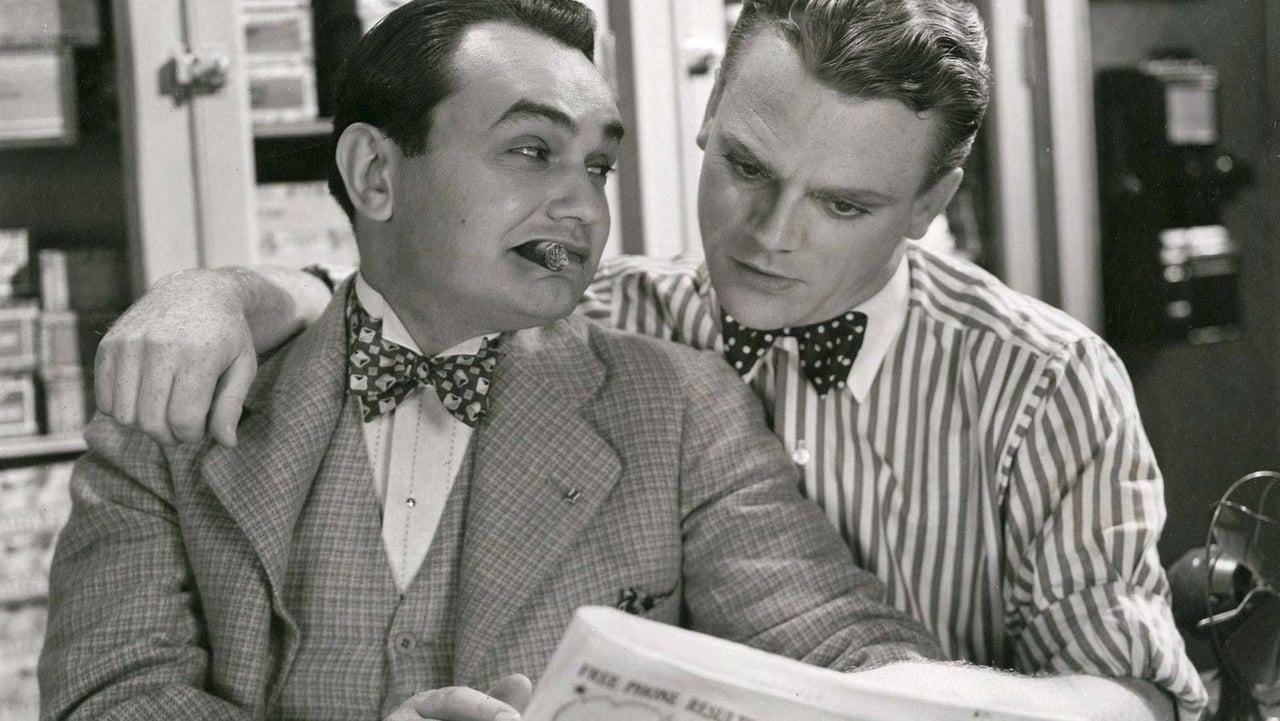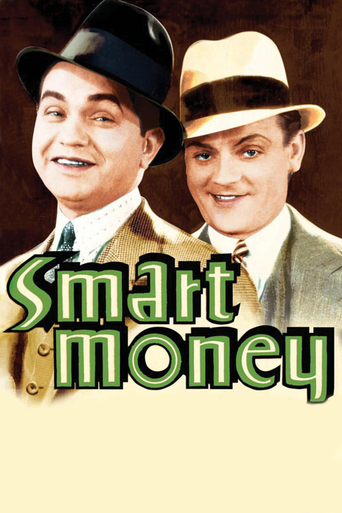

Edward G. Robinson is flashy but vulnerable as a lucky barber who aspires to become a big city gambler. Encouraged by his success in the backroom dice game in his barber shop, Robinson convinces his friends that he's got the touch, borrows a stake, and heads off to make his fortune. The obstacles he encounters include crooked hotel gamblers as well as a cigarette girl who tricks him out of a $100 bill. However, persistence and some shady tricks of his own eventually land Edward G. at the top of his profession: Nick the Barber runs the biggest gambling joint in town. Unfortunately, the D.A. looks askance at gamblers, however charismatic, and while the first section of the story shows Nick's rise to fame, the bulk of the picture deals with the personal and legal dangers that threaten to bring him down. James Cagney is fine in what is definitely a secondary role as Robinson's friend and chief assistant. Evalyn Knapp turns up late in the story as a depressed young woman who is rescued and taken in by Robinson. Cagney is sure she's a spy working for the D.A. and looking for evidence; Robinson trusts her completely. How will it all shake out? Whom can you trust, anyway?Like many of these early 30s dramas, this film offers no pat ending or definite moral message...it's a tale about taking a shot and stopping at nothing. Edward G. Robinson's performance, self-assured and stubbornly optimistic, makes it worth watching.Quick cast note: Boris Karloff has a bit as a shadowy figure who loses $100 to Edward G. early in the picture. Interesting that during this same year both Karloff and Cagney would see their careers take off.
... View MoreSmart Money (1931)A clever story about crime and misguided love (quasi-love) and about the love of money. What's wrong with that? Nothing here. With a remarkable performance by Edward G. Robinson (as usual), and supporting roles by a young James Cagney and a series of blondes who will more or less look alike at first. It might have been something of a formula production for the cast and crew, but it's during the lively pre-1934 sound era where, especially at a studio like Warner Bros., things manage to pop one way or another.As much as this is a very good film, completely engaging and without gaffes or sentimental slow downs, it remains secondary for 1931 because of several interesting things. First, Robinson had just become famous for "Little Caesar" where he had a shining (and roughly similar) role as a sort of good guy gangster. Second, Cagney was in a rare supporting role, not yet famous for his breakout role in "The Public Enemy" later the same year. Both of these Warner films are better, all around. And a third twist is the appearance early on of Boris Karloff, who was about to launch to superstardom as, yes, "Frankenstein," a Universal film from later in, yes, 1931. But you should watch "Smart Money" for what it does so well--tells a fast, multi-layered story with economy and life, and with great performances by the leads. The story and direction might fall short of classic, but it's still really solid.
... View MoreSmart Money is essentially a tale about the evils of gambling, and demonstrates the truth in the phrase "The higher you climb the further you fall" Edward G Robinson plays Nick 'The Barber' a guy who's two main loves in life are blonde's and gambling. However, the rules of probability does not apply to him as he seemingly never loses.James Cagney plays Jack, his sidekick, who's loyalty to Nick is so strong that tragic consequences are bound to arise.After many of the local gamblers pool their wealth to send Nick to the City to partake in a high stakes poker game with known gambling big shot Hicory Short, (later to be unmasked as Sleepy Sam, a professional conman), the arrogant but big hearted Nick feels he can't lose.His pride comes before a very large fall, and he is cleaned out by the gamblers. The next day he realises that he's been cheated with shaved cards and vows to get even with the crooks.He opens another Barber shop to raise funds for his 'rematch' and when the time comes, cheats the cheaters by using shaved cards himself, essentially becoming the Mr Big of the gambling world.However, this brings unwanted attention for the District Attorney's office who although not a gangster, murderer or even bootlegger, still views Nick as part of the City's 'undesirable' element.After helping in the rescue of a young blonde lady who's just been fished out of the river after a failed suicide attempt, Nick, who's still a kind decent man at heart takes her under his wing. Much to the chagrin of right hand man Jack, who neither likes nor trusts Nick's new companion.Playing on Nick's love of beautiful blonde's, (and one in particular), the DA's office set up a 'honey trap' to bring him down a peg or two.Smart Money is not a brilliant movie by any stretch of the imagination. though it is enjoyable enough to look forward to repeat watchings. It's a shame that Robinson's and Cagney's only pairing together wasn't a little better.At the time of filming, Cagney was still trying to fight his way out of the supporting player 'sidekick' roles and just before the film was released, The Public Enemy made only a few short months before, had already cemented Cagney's superstar status.One major criticism I do have about the film is the blatant racism shown toward the black characters. I am usually one of the first people to advise viewers not to get too offended, and accept that the movie was made in a different time where these kind of stereotypes were not considered offensive. However, Smart Money goes WAY over the top. For instance one of the black characters is named 'Suntan' and another scene on a train sees a black porter given half a bank note as a tip and then told "You'll get the other half at the end of the line, if you're a good boy" and worst of all, the very patronising way that Nick always rubs the hair of the black characters for luck. I still have friction burns on my chin from when my jaw hit the floor on that one.That aside, Smart Money is a worthy inclusion in the filmography of both actors.Enjoy!
... View MoreYou might expect the only screen pairing of Edward G. Robinson and James Cagney to be a hard edged gangster drama on the order of Robinson's own "Little Caesar" or Cagney's "Public Enemy". In fact, "Smart Money" isn't a gangster flick per se, though it has it's seamy under world characters like Sleepy Sam (Ralf Harolde) and Hickory Short. Robinson even has a colorful handle of his own - Nick the Barber. You would think he got the name from cutting the throats of his victims, but he's actually a barber by profession, and a mighty lucky one at that. When his buddy Jack (Cagney) comes up with the idea to stake him for ten grand to go big time, Nick sees it as an opportunity to rise above his meager Irontown surroundings.That's where the story gets a little sloppy for my taste. After Nick gets hustled in 'The City', there are no repercussions over the lost grubstake back in Irontown. Word of his embarrassing loss doesn't seem to faze a new group of financial backers who raise another fifty thousand dollars, which he uses to track down Sleepy Sam in 'Another City' for revenge. I got a bit of a kick out of that actually, why not just call 'Another City' New York, since 'Walter Winchell on Broadway' headed one of his columns on the fast rising card sharp Nick the Barber. Which brings up another question - how would the results from a series of private card games ever make it into the newspaper? Robinson gets to play against a number of pretty blonds in the picture as he fancies himself a ladies man, but boy, the lines they came up with in the 1930's were something else. How about his come on to Marie early in the story - "Say you're a cute little trick"! There's also the blatant racism of the era; when Nick tears a bill in half for the black porter on the train, he states that the other half would be "at the other end of the line, if you're a good boy".Back to Robinson and Cagney together in this film. I almost hate to say it, but Cagney's character was a bit swishy in the story, getting touchy feely with Nick more than once. Any doubt of the homosexual subtext to their relationship is put to rest near the end of the story when they argue over Irene (Evalyn Knapp) staying at Nick's apartment. When Jack demands to know 'how long is this gonna last?', Nick replies "She'll be gone in a couple of days, and then you can be my sweetheart again dearie". Do you know how many times I had to play that over to be sure I heard it right? The one thing that's kind of intriguing if you've seen some of Cagney's very first films, he had a commanding presence in those pictures even when second billed or in a bit part. Here it looks like he might have been asked to tone it down a bit in deference to his co-star. Not to say he was laid back, considering my comments above, but it didn't look like he was willing to upstage Robinson. It's a little surprising that the two actors worked only this one time together, considering they crossed paths with other Warner Brothers contract players numerous times, like Humphrey Bogart, Bette Davis and Joan Blondell to name just a few.
... View More